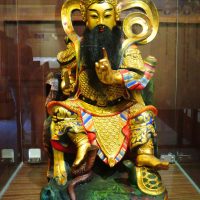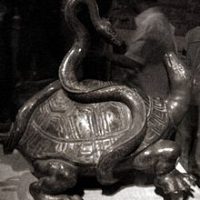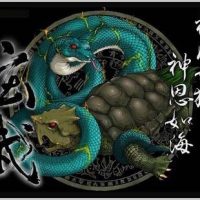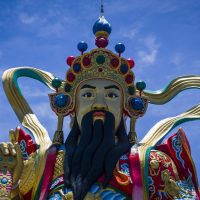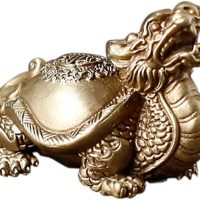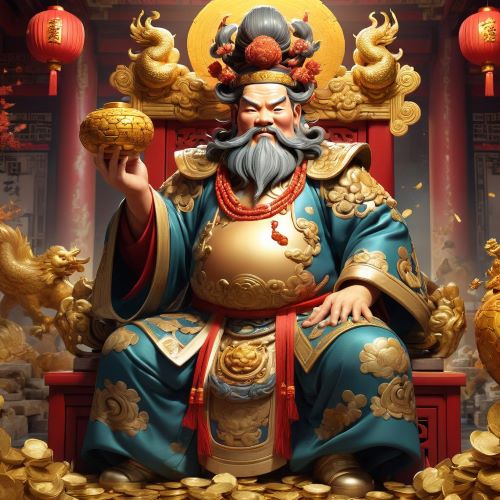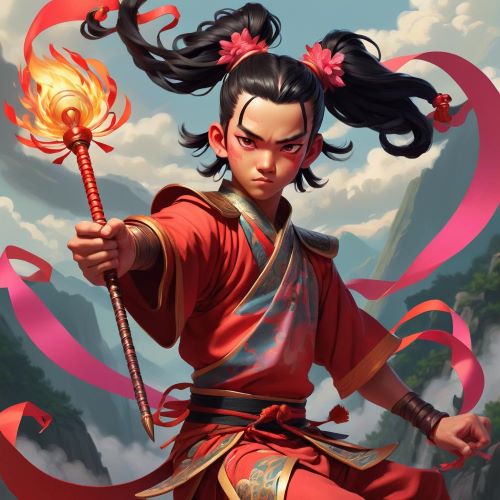Xuanwu : The Chinese God of Protection and the Northern Heavens
Listen
At a glance
| Description | |
|---|---|
| Origin | Chinese Mythology |
| Classification | Gods |
| Family Members | N/A |
| Region | China |
| Associated With | Magic, North |
Xuanwu
Introduction
Xuanwu, colloquially referred to as the Black Tortoise, commands deep reverence within Chinese mythology and holds a distinguished position among the higher echelons of Taoist deities. His dominion extends over the northern realms, resonating strongly with the essence of the winter season. Within the pantheon of Chinese constellations, Xuanwu occupies a significant role as one of the revered Four Symbols, his form often depicted as a fusion of a tortoise entwined with a serpent. Known alternately as Zhenwu or Zhenwudadi, Xuanwu presents a compelling enigma in Chinese lore, serving as a bridge between the celestial and terrestrial spheres. This dual identity imbues him with a multifaceted significance, embodying both celestial symbolism and the revered status of a deity.
Physical Traits
Xuanwu’s iconic visage is characterized by his striking composite form, often depicted as a serpent coiling around a turtle. The turtle’s shell, typically rendered in shades of black or dark green, serves as a potent emblem of the north and the wintry realm within Chinese astronomical lore. Complementing this, the snake, portrayed in hues of black or yellow, embodies traits of resilience and wisdom, adding depth to Xuanwu’s symbolism.
In many artistic renditions, Xuanwu assumes the guise of a formidable warrior garbed in somber robes, wielding both a sword and a seal. These accoutrements are laden with significance, symbolizing his dual role as a protector and a figure of authority. The sword represents his readiness to defend against threats, while the seal signifies his dominion and governance over cosmic forces.
This amalgamation of the tortoise and the serpent encapsulates Xuanwu’s transcendence beyond earthly confines, allowing him to traverse between realms with ease. The turtle’s shell serves as a bastion of resilience and safeguarding, shielding him and those under his protection from harm. Meanwhile, the serpent embodies the transformative power of wisdom, signifying Xuanwu’s capacity for profound insight and adaptability in the face of adversity.
Moreover, the depiction of Xuanwu as a tortoise intertwined with a snake is laden with symbolic significance. This imagery evokes a sense of inner conflict or hibernation, symbolizing the depths of winter. Furthermore, in some portrayals, Xuanwu is depicted subduing a tortoise, emblematic of his mastery and control over powerful cosmic forces, further solidifying his status as a deity of formidable prowess and influence.
Family
Xuanwu’s familial connections remain veiled in the annals of mythology, lacking explicit mentions within the lore. However, depictions of him often feature two esteemed generals, General Wan Gong and General Wan Ma, standing alongside him. These figures, revered deities in their own right, attend to a myriad of local concerns ranging from matters of childbirth, health, and familial affairs to the intricate consultations of feng shui.
The origins of Xuanwu are a subject of intrigue and variation across different sources. Some narratives propose him as the progeny of the Heavenly Emperor and the Earthly Mother, while others suggest his emergence from the cosmic egg alongside the three other cardinal protectors of Chinese cosmology. Yet, the role most frequently ascribed to him is that of the principal deity governing the Northern Black Tortoise constellation.
In his association with the north, Xuanwu is sometimes portrayed as the offspring of the Jade Emperor, sovereign of the celestial realms, and the goddess of the north, embodiment of winter’s chill and the element of water. Furthermore, ties between Xuanwu and the mythological figure of Guan Yin, the compassionate goddess of mercy, underscore his multifaceted nature and interconnectedness with fellow divine entities, adding layers of complexity to his divine persona.
Other names
Xuanwu, the enigmatic figure of Chinese mythology, is known by an array of titles, each imbued with profound significance. His name translates to ‘Mysterious Warrior,’ evoking an aura of mystique and strength. Alternately, he is recognized as Xuandi, Zhenwu, or Zhenwudadi. In the linguistic context of Japan, the characters for his name are pronounced as Genbu.
The etymology of Xuanwu’s name unveils layers of meaning. “Xuan” connotes “dark” or “profound,” while “wu” denotes “warrior” or “military.” This symbolism aligns with his association with the north, a cardinal direction steeped in mystery and potency within Chinese cultural narratives.
Moreover, Xuanwu is often invoked by various epithets, including “True Warrior” or “Truly Valiant,” spotlighting his role as a guardian endowed with martial prowess. Another title, “True Martial Great Emperor” or “Truly Valiant Great Emperor,” underscores his esteemed status within the Taoist pantheon. Lastly, “True Martial Great Emperor of the Profound Heaven” further accentuates his celestial lineage and significance.
Powers and Abilities
Xuanwu is revered as a powerful god, able to control the elements and wield great magic. He holds the title of the god of the north and is especially revered by martial artists. In some narratives, Xuanwu is depicted as the awakened form of the Mystic Deep Turtle, a Holy Spirit Beast formed by the fusion of a tortoise and a snake. Known for his vast array of powers and abilities, Xuanwu is believed to possess exceptional martial prowess, commanding the forces of nature associated with the north and winter, wielding potent magic capable of exorcising demons and protecting the righteous, and bestowing blessings and protection upon his devotees.
Modern Day Influence
Xuanwu’s reverence persists strongly in modern society. As Han Chinese populations migrated southward from regions like Hebei and Henan during the Tang-Song era, his veneration spread to provinces such as Guangdong, Guangxi, and Fujian, as well as among diasporic communities abroad. His enduring influence permeates diverse cultural customs and local traditions.
In religion, Xuanwu retains his esteemed status within Taoism, where temples dedicated to him stand as centers of worship, honoring his protective and auspicious attributes. Within folklore, tales recounting Xuanwu’s heroic deeds continue to circulate widely, reinforcing his portrayal as a formidable guardian and emblem of resilience.
Moreover, Xuanwu’s presence extends into the realms of arts and entertainment, manifesting in various artistic expressions like paintings, sculptures, and even video games, all of which serve to perpetuate his timeless legacy. Additionally, geographical landmarks across China bear names that pay homage to Xuanwu, such as Xuanwu Lake in Nanjing and Xuanwu District in Xi’an, serving as tangible reminders of his enduring cultural significance.
Related Images
Sources
Wikipedia. (n.d.). Xuanwu (god). In Wikipedia. Retrieved from https://en.wikipedia.org/wiki/Xuanwu_%28god%29
Wisdomlib.org. (2025, August 28). Xuan wu, also known as Zhenwu: Significance and symbolism. Retrieved from https://www.wisdomlib.org/concept/xuan-wu
Godchecker. (2019, April 21). Xuan Wu – the Chinese fabulous creature. Retrieved from https://www.godchecker.com/chinese-mythology/XUAN-WU/
StoriesPub. (n.d.). Xuanwu: God of Water & North in Chinese Mythology. Retrieved from https://storiespub.com/xuanwu-god-of-north-and-water/
5. (2025). Devotion to Ong Bon (Xuan Tian Shang Di) of the Chinese … International Journal of Social Sciences, Humanities & Management Research, 4(1). Retrieved from https://ijsshmr.com/v4i1/Doc/9.pdf
Frequently Asked Questions
Who is Xuanwu in Chinese mythology?
Xuanwu is a powerful celestial deity known as the Black Tortoise of the North and a protector against evil. He rules over the element of water and the winter season.
What does Xuanwu look like?
He is commonly portrayed as a dark-armored warrior standing with a tortoise and serpent intertwined — symbolic guardians representing endurance and renewal.
What is Xuanwu’s role in Taoism?
In Taoism, Xuanwu is revered as a divine protector who purifies negative forces. He is believed to heal illnesses and defend against malevolent spirits.
Why are a tortoise and serpent associated with Xuanwu?
The tortoise represents stability and longevity, while the serpent signifies transformation. Together, they symbolize eternal balance and cosmic protection.
Where is Xuanwu worshipped today?
Xuanwu remains popular in temples across China and East Asia. Many believers pray to him for health, safety, and protection during challenging times.


